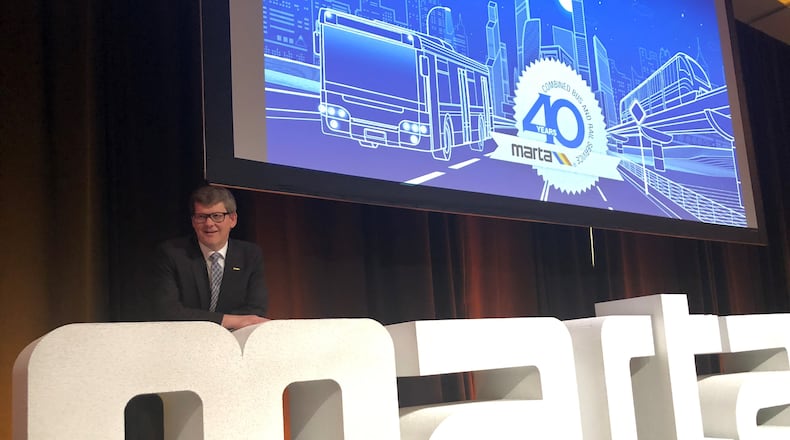MARTA CEO Jeffrey Parker called for a $100 billion “moonshot for transit” for metro Atlanta – a massive investment that would dwarf existing expansion plans in coming decades.
With the region's population set to grow by 2.5 million by 2040, Parker said a major investment in transit would be needed to keep pace. At the annual "State of MARTA" breakfast in Midtown on Friday, he said the investment would also help metro Atlanta keep up with economic rivals like Los Angeles and Seattle, which have made big investments in public transportation in recent years.
"We have to make bold decisions now that include a landmark investment in our transit network to fund innovative solutions for our traffic woes and renew our commitment to future generations," Parker told more than 500 political and business leaders gathered in Atlanta.
VIDEO: More on MARTA
A $100 billion investment would be a dramatic increase over current transit expansion plans. By comparison, in 2016 Atlanta voters approved a $2.7 billion, 40-year plan to expand MARTA in the city. And in March Gwinnett County voters will consider a $5.5 billion, 30-year plan.
Parker offered no specifics – including where the money would come from or how it would be spent. Instead, he said his proposal is “a big goal - a moonshot for transit - that we can collectively embrace and work towards.”
His sweeping statements went over well in a Loews Atlanta Hotel conference hall packed with transit supporters.
“This was a necessary speech – positively inspiring,” said DeKalb County CEO Michael Thurmond.
But a mammoth transit spending plan may not be greeted as warmly by Gov.-elect Brian Kemp's administration. Though his predecessor, Nathan Deal, has embraced transit – signing transit expansion legislation and devoting $100 million toward bus rapid transit infrastructure on Ga. 400 last year – Kemp has signaled the needs of rural Georgia are higher on his list of priorities.
Skepticism of Parker’s $100 billion goal surfaced quickly Friday.
“That’s about 50 years of current GDOT spending,” state Rep. Brett Harrell, R-Snellville, said on social media. “Not an ROI [return on investment] that sounds appealing to me.”
RELATED CONTENT
Nonetheless, Parker’s ambition is the latest evidence that transit’s fortunes in Georgia – and MARTA’s, in particular – have dramatically improved in recent years.
Voters in Clayton County and Atlanta have approved new MARTA sales taxes in recent years. Clayton residents will get a commuter rail line, while Atlanta will get a mix of light rail, bus rapid transit and regular bus service upgrades, among other improvements.
Thanks to the state's new transit law, MARTA is poised to expand deeper into the region's suburbs. Gwinnett voters will consider extending MARTA rail to Norcross and launching bus rapid transit and other new services.
Fulton County voters may consider a transit referendum as soon as this fall. DeKalb and Cobb counties are preparing expansion plans that could also lead to ballot measures.
Meanwhile, a state House of Representatives committee is studying transit in rural Georgia and is seeking permanent state funding for public transportation – funding that could benefit metro Atlanta.
It’s unlikely those initiatives alone would meet Parker’s $100 billion goal. On Friday, he talked of diversifying revenue streams and counting on new technology – like autonomous vehicles – to help extend transit’s reach.
He noted that other regions are making big investments in transit. Los Angeles will spend $120 billion over the next 40 years. Seattle will spend $54 billion over 25 years. In the Washington, D.C., area, business leaders have called for a $500 billion investment over 20 years.
Parker said a $100 billion investment in “transit and technology” is a goal that would “profoundly transform mobility and ensure metro Atlanta can continue to grow into a truly world class region.”
Even as he stoked support for transit expansion, Parker unveiled initiatives to improve service for existing customers. He plans to establish a new rider advisory committee to provide customers a formal voice in the agency. And he plans to hire a “chief customer experience officer” to ensure such concerns get more attention.
Among other things, Parker also announced a multi-year effort to renovate all 38 MARTA rail stations and an effort to improve employee training.
“The bottom line is that the success of metro Atlanta is directly tied to the success of MARTA,” Parker told the crowd. “We share a common destiny – we’re dependent on each other.”
Why it matters
On Friday MARTA CEO Jeffrey Parker called for a $100 billion transit investment in metro Atlanta. Though he provided no specifics, his sweeping goal is the latest evidence that the fortunes of transit - and of MARTA, in particular - have improved dramatically in recent years.
About the Author
Keep Reading
The Latest
Featured




